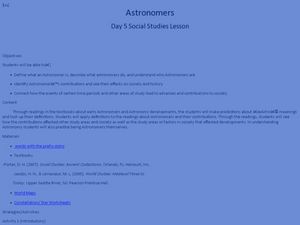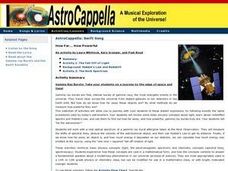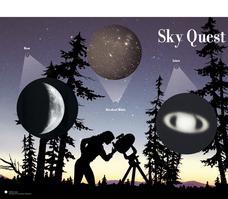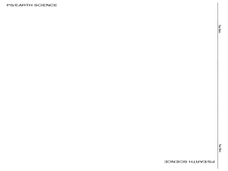Curated OER
Earth Science Lesson Plans on Geologic Time
Springboard your fourth and fifth graders into the study geologic time. They will complete 7 activities to learn about geologic time and the topics most often associated with it: astronomy, creation, planet formation, volcanology,...
Curated OER
OUT OF THIS WORLD AND INTO OUR CLASSROOM
Young scholars create projects on Astronomy using math concepts and use of Internet resources.
Curated OER
Astronomers
Young scholars explore the profession of astronomy. In this social studies lesson, students read articles on astronomers contributions to society and history. Young scholars reference the Bible for recorded astronomies impact on the...
Curated OER
Eyes on the Sky, Feet on the Ground
Fifth graders participate in online astronomy activities with hundreds of fun explorations into astronomy as a classroom tool for learning how to theorize, experiment, and analyze data.
Curated OER
The Universe in a Different Light
Pupils become aware of some of the objects studied in, and concepts associated with, high-energy astronomy. They do this by participating in card games that teach and review these concepts.
Curated OER
Where in the World is 5T?
Students use the Internet to research astronomy questions written by another class. As questions are answered, clues are given telling where the other class is "hiding" in the world.
Curated OER
Where in the World is 5MT?
Young scholars use the Internet to research astronomy questions written by another class. As questions are answered, clues are given telling where the other class is "hiding" in the world.
Curated OER
Distance And Parallax
Students will determine distances to nearby stars using parallax. In this Astronomy lesson plan, students will use a web program, trigonometry, and sketches to determine the distance of stars.
Curated OER
Summer Research Program for Science Teachers
Students analyze the optical region of the electromagnetic spectrum.
Curated OER
Black Holes
Students explore what black holes are and how gravity is associated with them. In this space lesson students are given enough information to imagine a journey to a black hole.
Curated OER
Why Do We Have Night?
Students engage in a fun, creative way to discover how the Earth moves. This lesson helps students explain why there is day and night. It can also create curiosity to further study the solar system and eclipses!
Curated OER
A Tour of Saturn and Uranus
Second graders draw and label each planet, Saturn and Uranus, showing 2 specific individual characteristics of each.
Curated OER
Egypt's golden Empire
Students explore many of the key scientific and technological contributions made by the ancient Egyptians. Researched data is presented to the entire group.
Curated OER
Islamic Scientific Contributions to Civilization
Seventh graders explore several well documented artistic and scientific accomplishments that were discovered or perfected during The Golden Age of Islam. They are staff writers of a magazine who create a feature article about a topic...
Curated OER
How Far... How Powerfu
Students work with a real optical spectrum of a gamma ray burst afterglow taken at the Keck Observatory. They measure the shifts of spectral lines, deduce the velocity of the astronomical object, and then use Hubble's Law to get its...
Curated OER
The Sun: Earth's External Heat Engine Part 1 of the Astronomy Model
Students become familiar with the variables that control Earth's solar energy supply. They explore the source and nature of solar energy, the genesis of radiation, and the structrue of the Sun, gas spectra are observed and sample...
Curated OER
And a Star to Steer Her By: A Field Trip Guide for the Planetarium Show
In this field trip study guide for the planetarium show lesson, learners construct a model of the Earth and describe the relative positions of the continents using latitude and longitude. Students construct a star chart to find...
Curated OER
Sky Quest: Exploring the Constellations
Young scholars examine constellations and planets through completing various activities. Students work individually and in groups to create drawings based on stars, compare and contrast the night sky with and without a telescope and...
Curated OER
Areas Under Curves: An Astronomical Perspective
In this area under the curve activity, students use a graph of the number of exoplanets discovered and the year they were discovered to solve 5 problems. Students find the total area under the curve, they find the total number of planets...
Curated OER
Astronomy in the Round
In this round astronomical bodies worksheet, students use 6 photographs of various solar system bodies to answer 5 questions related to the roundness of these bodies. They create a number to represent the roundness of an object and they...
Curated OER
Scientific Notation II
In this scientific notation activity, students are given 10 sets of numbers expressed in scientific notation. They either add or subtract the given numbers.
Curated OER
Twinkle, Twinkle, Little Star Lab
In this space science worksheet, 7th graders use the star circles given but the teacher to complete 14 short answer questions. They plot the stars on the graph.
Curated OER
Earth Science: travel
In this earth science worksheet young scholars complete a series of multiple choice and short answer questions that includes solar radiation, temperature, porosity and rock formations.
Curated OER
Getting to Know Saturn: The Saturn System
Learners compare and contrast Earth and Saturn's planet features. In this space science lesson plan, students draw a diagram of the solar system and identify the different components. They complete a Saturn system scavenger hunt and Venn...
Other popular searches
- Astronomy and Space Science
- Astronomy Vocabulary
- Planets and Astronomy
- Astronomy Activity
- Science Astronomy
- Ancient Astronomy
- Astronomy Lesson Plans
- History of Astronomy
- Space Science Astronomy
- Space and Astronomy
- Astronomy Navigation
- Astronomy History

























